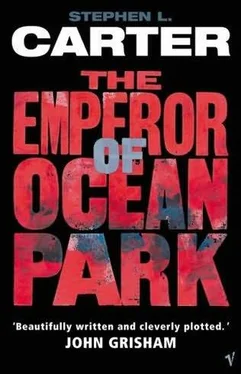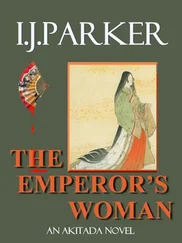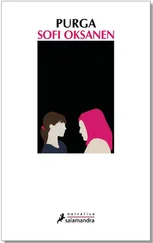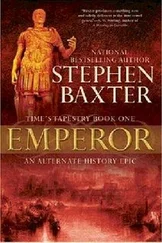Stephen Carter - Emperor of Ocean Park
Здесь есть возможность читать онлайн «Stephen Carter - Emperor of Ocean Park» весь текст электронной книги совершенно бесплатно (целиком полную версию без сокращений). В некоторых случаях можно слушать аудио, скачать через торрент в формате fb2 и присутствует краткое содержание. Жанр: Криминальный детектив, на английском языке. Описание произведения, (предисловие) а так же отзывы посетителей доступны на портале библиотеки ЛибКат.
- Название:Emperor of Ocean Park
- Автор:
- Жанр:
- Год:неизвестен
- ISBN:нет данных
- Рейтинг книги:3 / 5. Голосов: 1
-
Избранное:Добавить в избранное
- Отзывы:
-
Ваша оценка:
- 60
- 1
- 2
- 3
- 4
- 5
Emperor of Ocean Park: краткое содержание, описание и аннотация
Предлагаем к чтению аннотацию, описание, краткое содержание или предисловие (зависит от того, что написал сам автор книги «Emperor of Ocean Park»). Если вы не нашли необходимую информацию о книге — напишите в комментариях, мы постараемся отыскать её.
Emperor of Ocean Park — читать онлайн бесплатно полную книгу (весь текст) целиком
Ниже представлен текст книги, разбитый по страницам. Система сохранения места последней прочитанной страницы, позволяет с удобством читать онлайн бесплатно книгу «Emperor of Ocean Park», без необходимости каждый раз заново искать на чём Вы остановились. Поставьте закладку, и сможете в любой момент перейти на страницу, на которой закончили чтение.
Интервал:
Закладка:
(II)
Ours is an old family, which, among people of our color, is a reference less to social than to legal status. Ancestors of ours were free and earning a living when most members of the darker nation were in chains. Not all of our ancestors were free, of course, but some, and the family does not dwell on the others: we have buried that bit of historical memory as effectively as the rest of America has buried the larger crime. And, like good Americans, we not only forgive the crime of chattel slavery but celebrate the criminals. My older brother is named for a particular forebear, Waldo Addison, often viewed as our patriarch, a freed slave who, in freedom, owned slaves of his own until forced to flee northward in the 1830s, after Nat Turner’s rebellion led the Commonwealth of Virginia to rethink the status of the free negroes-small “n”-as they were then called. He stopped briefly in Washington, D.C., where he lived in the mosquito-infested slum known as George Town, more briefly still in Pennsylvania, and at last wound up in Buffalo, where he made the transition from farmer to barge worker. What became of Waldo’s six slaves family history does not reveal. We do, however, know something of the man himself. Grandfather Waldo, as my father liked to call him, became involved in the abolitionist movement. Grandfather Waldo knew Frederick Douglass, my father always said, although it is difficult to imagine that they were friends, or, indeed, that they had much in common, aside from the fact that both had been enslaved. My father liked to speculate about Grandfather Waldo’s possible involvement in the underground railroad-his work on the lakes and canals made it logical, my father would say, bright-eyed with hope. As my father aged, the speculation hardened into fact, and we would sit out on the wraparound porch of the Vineyard house in the evening cool, sipping pink lemonade and swatting away mosquitoes, while he described Waldo’s unlikely exploits as though he had seen them himself: the risks he ran, the schemes he hatched, the credit he deserved. But there was never any evidence. What few facts we have suggest that Grandfather Waldo was a drunken, thieving, self-interested scoundrel. Waldo’s four sons, as far as we know, were all scoundrels too, and his lovely daughter Abigail married another, but it was her no-good husband, a textile worker in Connecticut, who gave us the family name. Abigail’s only son was a preacher, and his eldest son a college professor, and his second son was my father, who has been many things, including, at his highest, a federal judge, the close confidant of two Presidents, and, almost, a Justice of the Supreme Court; and, at his lowest, the unindicted but publicly humiliated target (Mariah, who inclines toward melodrama, says victim) of investigations by every newspaper and television network in the country, to say nothing of two grand juries and three congressional committees.
And now he is dead. Death is an important test for families as old and, I might say, as haughty as ours: repressing our anguish is as natural as driving German cars, participating in the Boule, vacationing in Oak Bluffs, and making money. My father would not have wanted tears. He always preached leaving the past in the past- drawing a line, he called it. You draw a line and you put yourself on one side of the line and the past on the other. My father had many of these little epigrams; in the proper mood, he would recite them in his ponderous way as though expecting us to take notes. My siblings and I eventually learned not to go to him with our problems, for all we would ever receive in return were his stern face and heavy voice as he lectured us on life, or law, or love… especially love, for he and our mother had one of the great marriages, and he imagined himself, in consequence, one of the great experts. Nobody can resist temptation all the time, the Judge warned me once, when he thought, wrongly, that I was contemplating an affair with my future wife’s sister. The trick, Talcott, is to avoid it. Not a particularly profound or original insight, of course, but my father, with his heavy judicial mien, could make the most mundane and obvious points sound like the wisdom of the ages.
Talcott, I should explain, is my given name-not Misha. My parents selected it to honor my mother’s father, whom they expected to leave us money in consequence, which he dutifully did; but I have hated it ever since I was old enough to be teased by schoolmates, a very long time. Although my parents forbade the use of diminutives, friends and siblings mercifully shortened my name to Tal. But my closest comrades call me Misha, which, you will correctly have guessed, is the Anglicized version of a Russian name, the diminutive for Mikhail, which has been, from time to time, one of my other sobriquets. I am not Russian. I speak no Russian. And my parents did not give me a Russian name, for, other than a few dedicated Communists in the thirties and forties, what black parents ever did? But I have my reasons for preferring Misha, even though my father hated it.
Or perhaps because he did.
For my father, like most fathers, had that effect on us too: my siblings and I have all been defined in part by our rebellion against his autocratic rule. And, like most rebels, we often fail to see how much we have come to resemble the very thing we pretend to loathe.
I need a break.
To please Mariah, I spend a few minutes in the kitchen with the tearful Sally, who was raised by my father’s only brother, my late Uncle Derek, whom the Judge abhorred for his politics. She is a cousin by marriage, not blood: she was the daughter of Derek’s second wife, Thera, and her first husband, but Sally refers to Derek as her father. Sally has become a pudgy, lonely woman, with unhappy doe eyes and wildly styled hair; comforting her now, I see nothing of the daring, aggressive teenager who was, long ago, Addison’s secret lover. These days, Sally works on Capitol Hill for some unknown subcommittee, a job she secured through my father’s waning influence when she could hold no other. Sally, who has had her troubles, focuses every conversation, within seconds of its beginning, on how badly she has been treated by every person she has ever known. She wears dresses in alarming floral patterns, always too tight, and, although she no longer drinks the way she used to, Kimmer reports seeing her slip pills by the handful from the canvas tote bag she carries everywhere. She has the bag with her now. Patting Sally’s broad back, I try to measure her intake of whatever she is hiding by the slurring of her voice. I remind myself that she was once warm and vivacious and funny. I accept a slurpy kiss a little too close to my lips, and at last escape to the foyer. I hear Alma’s wheezy cackle but do not turn. I notice Howard again, still doing business, the red nimbus still flashing from his neck. I need to escape, but Mariah will be furious if I leave the house, and I have never been very good at bearing the fury of women. I yearn for the simple rejuvenating pleasure of chess, perhaps played online, using the laptop I left back at the Madisons’.
But, for now, simple privacy will have to do.
I slip into the small room that was once my father’s study, since converted to a small library, with low cherrywood bookshelves along two walls and, beneath the window, a tiny antique desk with a two-line telephone. The paneling is cherry too, decorated not with self-congratulatory photographs (those are upstairs) but with a handful of small tasteful drawings by unknown artists, along with an original Larry Johnson watercolor-not his best-and a tiny but very nice Miro sketch, a recent gift to the Judge from some conservative millionaire. I wonder, for a greedy moment, which of the children gets the Miro, but I suppose it stays with the house.
Читать дальшеИнтервал:
Закладка:
Похожие книги на «Emperor of Ocean Park»
Представляем Вашему вниманию похожие книги на «Emperor of Ocean Park» списком для выбора. Мы отобрали схожую по названию и смыслу литературу в надежде предоставить читателям больше вариантов отыскать новые, интересные, ещё непрочитанные произведения.
Обсуждение, отзывы о книге «Emperor of Ocean Park» и просто собственные мнения читателей. Оставьте ваши комментарии, напишите, что Вы думаете о произведении, его смысле или главных героях. Укажите что конкретно понравилось, а что нет, и почему Вы так считаете.












